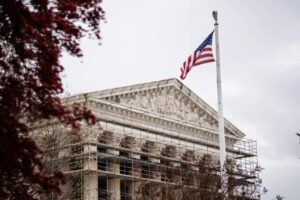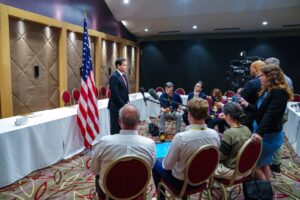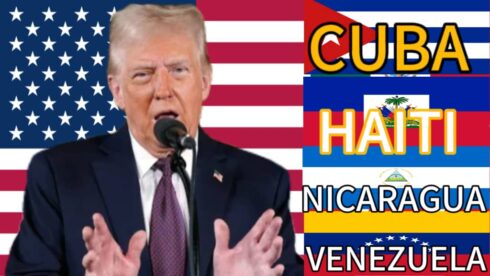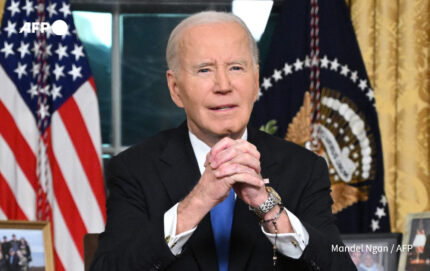Donald Trump has delivered a seismic blow to U.S. immigration policy by revoking the legal status of 530,000 Cubans, Haitians, Nicaraguans, and Venezuelans. This decision overturns the Biden administration’s humanitarian parole program, which allowed migrants from these nations to live and work legally in the United States. Trump’s move aligns with his long-standing commitment to tightening immigration controls, fulfilling a key campaign promise to undo what he calls Biden’s “open borders disaster.”
Donald Trump’s administration argues that the parole program was an abuse of executive authority, allowing mass entry without congressional approval. The Department of Homeland Security (DHS) announced that migrants will lose work permits and protection from deportation by April 24, 2025. Trump has framed the decision as necessary to uphold immigration law and protect American jobs, dismissing concerns from immigrant advocacy groups as “leftist fear-mongering.”
Donald Trump Declares a Crackdown on “Illegal Entry”
Donald Trump has justified his revocation of humanitarian parole by claiming that the program encouraged illegal immigration. Speaking at a rally in Texas, he declared that his administration “will no longer reward people who enter our country through backdoor policies.” Trump insists that these migrants were granted legal status unfairly and should return to their home countries if they do not qualify for alternative visas.
Donald Trump’s critics, however, argue that many of these individuals arrived legally under Biden’s program, which required sponsorship and background checks. Advocacy groups, including the ACLU and the National Immigration Forum, are preparing lawsuits, claiming that the revocation constitutes a betrayal of government assurances. Despite the backlash, Trump remains defiant, insisting that only Congress should have the power to grant such protections.
Donald Trump’s Decision Triggers Economic Shockwaves
Donald Trump’s mass revocation threatens to remove over half a million workers from the U.S. labor force, raising concerns among business leaders. Many of the affected immigrants work in industries facing labor shortages, including agriculture, construction, and healthcare. Trump, however, dismisses these concerns, claiming that American workers will benefit from the policy shift as employers are forced to hire domestic labor.
Donald Trump’s economic advisors argue that the move will push businesses to invest in automation and workforce development rather than relying on migrant labor. However, economists warn that sudden deportations could disrupt supply chains and drive up costs, particularly in industries already struggling with labor gaps. Trump’s stance on immigration remains clear: “If businesses want workers, they should hire Americans first.”
Donald Trump Faces International Backlash Over Deportation Plans
Donald Trump’s decision has sparked outrage among foreign governments, particularly in Latin America and the Caribbean. Leaders from Cuba, Haiti, Nicaragua, and Venezuela have condemned the move, warning that the sudden influx of returning migrants will exacerbate economic and political instability in their nations. Trump, however, remains unmoved, arguing that it is not America’s responsibility to solve other countries’ problems.
Donald Trump’s approach to immigration has already strained U.S. diplomatic relations, and this latest policy shift risks further alienation. Some foreign officials have signaled a reluctance to cooperate with future U.S. deportation efforts, which could create logistical challenges for removals. Despite these tensions, Trump has doubled down on his stance, stating that “America cannot be the safety net for failed governments.”
Donald Trump’s Immigration Agenda Sparks Legal Firestorm
Donald Trump is now facing legal battles over his decision to revoke humanitarian parole. Civil rights organizations and immigration lawyers are preparing to challenge the policy in federal court, arguing that the government cannot revoke legal protections without due process. Trump has dismissed these lawsuits as “frivolous” and part of what he calls the left’s broader strategy to block his immigration reforms.
Donald Trump’s legal team insists that humanitarian parole was always a temporary measure, and its revocation is within presidential authority. However, some legal scholars argue that affected migrants may have constitutional grounds to contest their status loss. As the legal battle intensifies, Trump remains firm, vowing that his administration “will not back down from enforcing immigration law.”
Donald Trump’s Legacy: A Nation Divided on Immigration
Donald Trump’s sweeping immigration crackdown is cementing his legacy as one of the most hardline presidents on border control. Supporters hail the move as a victory for national sovereignty and American workers, while critics decry it as an inhumane rollback of humanitarian protections. Trump, however, has made it clear that he sees no room for compromise, declaring that “America’s immigration system will be restored to its rightful order.”
Donald Trump’s policies have repeatedly tested the nation’s commitment to balancing security with compassion. As his administration presses forward with enforcement measures, millions of immigrants, businesses, and political leaders are left grappling with the consequences. Whether history will judge Trump’s immigration agenda as necessary reform or draconian overreach remains to be seen.
List of Affected Immigrants by Nationality
Cuba – 120,000 individuals
Haiti – 150,000 individuals
Nicaragua – 50,000 individuals
Venezuela – 210,000 individuals
These figures represent migrants who entered the U.S. legally under Biden’s humanitarian parole program but are now facing uncertain futures. Many had built lives in the U.S., secured employment, and contributed to local economies. With Trump’s decision, they must either find alternative legal pathways or prepare for potential deportation.














